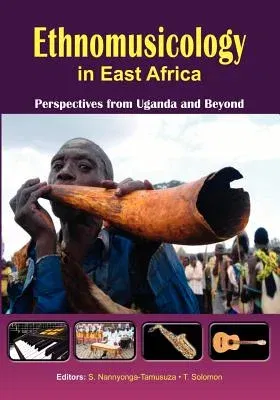Ethnomusicology in East Africa is a first in this part of the world. It
brings together thinkers and artists from Uganda, East Africa and
further afield to discuss an area of vital importance to Africans as a
people. The book presents selected papers from the First International
Symposium on Ethnomusicology in Uganda, held at Makerere University in
Kampala on 23-25 November 2009. The symposium, organised by the
Department of Music, Dance and Drama (now the Department of Performing
Arts and Film) of the university and the Grieg Academy-Department of
Music at the University of Bergen, marked the end of the first period of
the project Ethnomusicology in Uganda: Education, Research and
Preservation of Cultural Heritage. Scholarly research on music in East
Africa has a long history, stretching back to the beginnings of
comparative musicology at the end of the Nineteenth Century during the
colonial period. With the growth of the field of ethnomusicology after
World War II, European and American researchers such as Klaus Wachsmann
and Gerhard Kubik helped to consolidate East Africa's place on the world
musical map, through both historical study and fieldwork-based
ethnographic research. This generation of scholars also shepherded
regional music studies through the period of formal political
decolonisation as the East African countries became independent in the
early 1960s. An important development in the field since the turn of the
twenty-first century has been the emergence of an increasing number of
professionally trained scholars from East African countries who have
contributed to the ongoing decolonisation of musical scholarship in
Africa. These ethnomusicologists have made important contributions not
only with their own original research in the region, but also in their
work strengthening the institutional bases for ethnomusicology in East
African countries. Their contributions include the establishment and
consolidation of local college and university study programmes in
ethnomusicology, their teaching of a new generation of East African
students, and their vigorous international networking within the East
African region and beyond. This book represents an important step in the
continued professionalisation of ethnomusicology in Uganda. It presents
new work by Uganda-based researchers, from students to academic staff,
and solidly places that work within the international scholarly
ethnomusicological conversation. We hope that the reader will find that
this collection of papers is more substantial and coherent than the
phrase 'conference proceedings' often implies, and that the work
presented here will be regarded as a significant contribution to the
study of music in Uganda and the wider East African region. With most of
the contributions coming from scholars from East Africa, this collection
thus confirms the decolonising trend toward 'indigenous' scholarship in
ethnomusicology, where 'we' participate in writing 'our' own culture.


